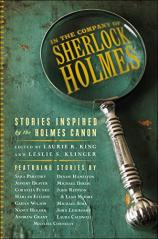In the Company of Sherlock Holmes: Stories Inspired by the Holmes Canon
Review
In the Company of Sherlock Holmes: Stories Inspired by the Holmes Canon
As an addendum to the bestselling A STUDY IN SHERLOCK, editors Laurie R. King and Leslie S. Klinger invited contemporary authors to contribute original stories inspired by Sir Arthur Conan Doyle’s legendary Sherlock Holmes tales. Following a lengthy copyright battle with Conan Doyle’s estate, detailed in the foreword, the characters and settings of Sherlock Holmes are now in the public domain. Here, an eclectic but accomplished group of novelists, primarily mystery and crime writers, take some intriguingly different looks at Holmes’ legacy.
Sherlock Holmes today is indisputably not only a literary legend, but also a pop culture commodity. Though each author takes a different approach, the familiar Holmes dominates each narrative. Watsons and Lestrades have their place, too, but unsurprisingly, it’s Holmes’ mystique that dominates each narrative. The character has always been an intriguing contradiction, his peerless intelligence and competence at odds with his wild moods and total ignorance of social niceties.
"The legacy of Sir Arthur Conan Doyle’s work and his most famous character is on rich display here, and IN THE COMPANY OF SHERLOCK HOLMES should be on the reading list of any Holmes fan."
Holmes is visited --- sometimes literally, in his Victorian-era home, other times figuratively --- by characters obviously inspired by him but not sharing his name. Other Sherlocks are given a modern twist. My personal favorite entry was Jeffery Deaver’s “The Adventure of the Laughing Fisherman,” which takes on a modern-day man obsessed with Sherlock Holmes, who decides to take his inspiration and natural deductive powers into the field and solve a crime. The modern contrivances of the story clearly bend to the Sherlock inside, as the protagonist deftly begins to deduce facts about his psychiatrist’s private life based on his schedule and a little jam stain on his pants.
This Sherlockian aspect is at this point almost a cliché --- no, certainly a cliché --- but it’s produced with such love and fervor that somehow it manages to work almost every time. And that’s the magic that I kept finding throughout these stories. The original Sherlock Holmes stories, canonized though they are, are repetitive nearly to a fault. Those repetitions naturally have only grown over time with the canonization and obsession with Holmes, but somehow they work. That is the magic of Holmes.
In another fine example, young adult fiction titan Cornelia Funke takes on another familiar trope in “Lost Boys.” I can’t count how many Sherlock Holmes stories begin with a qualification from Watson, reminding the reader that Holmes wouldn’t want the public to know this story or wouldn’t think it was a story worth knowing. Funke starts in a similar manner, qualifying the tale as one not to be shared with the public, as it reveals personal details Holmes holds dear. Watson muses, “I often wondered whether you unveil the crimes and secrets of others so passionately because they remind you of what you hide from the world.” Her examination of Holmes’ past and secrets offers new insight into the character, whose actions and deeds in Conan Doyle’s work are infamous, but whose motives for doing them are never quite clear.
Andrew Grant’s “Dr. Watson’s Casebook” offers a counterpoint to Funke’s darker meditation on the Holmes character, in what is easily the collection’s most lighthearted offering. Presented as a Facebook newsfeed of sorts, Grant playfully retells “The Hound of the Baskervilles” through a social media feed, complete with “likes,” shared articles and banter. The narrative is supported by moments such as “Dr. John Watson has joined the group Physicians Who Are Confused By Current Events.” The conceit, while gimmicky, works. One can almost imagine Holmes as that Facebook friend with a perfectly timed snippy comment on your status.
While not every piece in the collection is great, or even good, the editors have done a commendable job of collecting a truly diverse group of narratives playing with Sherlock Holmes. The legacy of Sir Arthur Conan Doyle’s work and his most famous character is on rich display here, and IN THE COMPANY OF SHERLOCK HOLMES should be on the reading list of any Holmes fan.
Reviewed by L. Whitney Richardson on December 5, 2014
In the Company of Sherlock Holmes: Stories Inspired by the Holmes Canon
- Publication Date: December 7, 2015
- Genres: Anthology, Fiction, Mystery, Short Stories
- Paperback: 384 pages
- Publisher: Pegasus
- ISBN-10: 1605989177
- ISBN-13: 9781605989174






